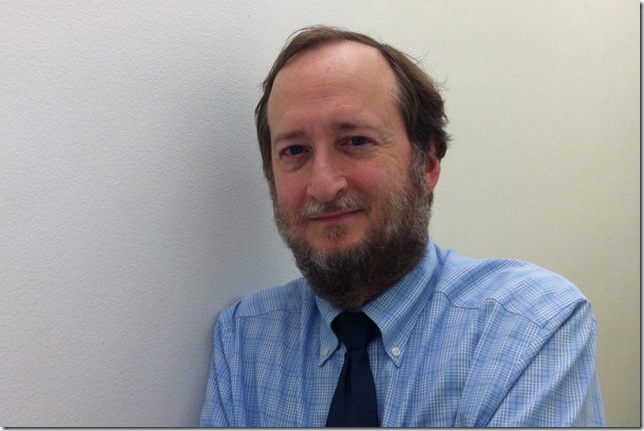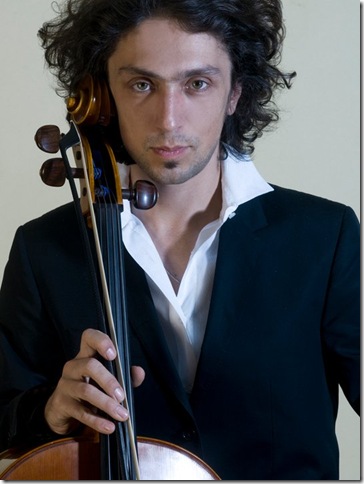New Music Festival: Thomas McKinley (Nov. 10, Lynn University)
For six years now, Lynn University’s Lisa Leonard has been running a weeklong fall-season festival devoted to new music and to the work of a featured composer.
Past composers have included Gunther Schuller and Kenneth Frazelle, but this year, Leonard stayed close to home by choosing Thomas McKinley, a Lynn composition professor who also serves as undergraduate adviser at the Conservatory of Music and as curriculum coordinator. The conservatory presented an evening devoted to McKinley’s music Thursday.
McKinley is a skilled and serious-minded composer, and judging by Thursday’s concert, one with a fondness for slow, deliberate openings out of which bigger structures evolve, for meditative moods, and for evocative cadenza-style lines for solo instruments. Seven works were on the program, dating from the late 1970s to today, including a world premiere of a work for clarinet and piano trio.
McKinley was helped in all of this by a fine collection of young performers, particularly Jesse Yukimura, whose dark-honey viola sound in McKinley’s 1996 Elegy to the Spanish Republic gave the music a strong sense of mourning, and flutist Jo Brand, who in Trialogue (1979) handled passages of rapid notes, flutter tonguing and big leaps with agility and sizable tone.
Pianist Anastasiya Timofeeva demonstrated power and strong technique in three knotty, sometimes fierce Fantasy Pieces for solo piano McKinley composed from 2004 to 2006, and flutist Fabian Alvarez gave McKinley’s Nocturne (1988) a fat, round sound, and plenty of space for its long lines to breathe; the able pianist was Agnieszka Sornek.
In the Fantasy (1981) for woodwind quintet, hornist Raul Rodriguez had the central role, dominating much of the musical discussion, and indeed bringing it to an abrupt halt as the other four instruments (flutist Alvarez, oboist Greg Stead, clarinetist Fabiola Porras, and bassoonist Noemi Rivera) built their “chatter” to a point of maximum notes. The world premiere work, Double Visions, was part new, part old, with a fresh first movement and a reworked second movement that McKinley said was derived from a 1989 seminar he took with British composer Peter Maxwell Davies.
The work was so named because the composer noticed similarities between the old and new parts, and there was much of McKinley’s basic approach here, with substantial solo spotlights amid the ensemble texture; the new movement’s language was more uncompromising, more savage, than the second. Each of the players – pianist Dan Yi, clarinetist Michael Kaiser, cellist Elis Ramos and violinist Delcho Tenev – showed good chops and gratifying attention to the music.
For the most part, McKinley’s music on this program was sober, moderately paced, and enamored of dramatic solo moments in which he is moved to say something important. But it was the earliest piece on the program, a Piano Trio from 1978, that offered the greatest enjoyment. This was a three-in-one-movement piece with real snap and memorable motifs, though not in any way Romantically tonal.
The middle of the final movement has a swingy, motoric rhythmic pattern in which the piano (Aneliya Novikova) bubbles along in kookily pointillist patterns, adding a welcome sense of energy and humor. Violinist Ann Fontanella and cellist Jared Cooper joined Novikova in clearly having great fun playing this attractive, muscular little work; it would have been nice to hear other McKinley compositions with the same kind of joyful spirit.
***
Ian Maksin (Arts Garage, Nov. 5)
Russian-born cellist Ian Maksin is well-suited for today’s multi-tasking, self-marketing, youth-oriented age of classical music. The former cellist for the Delray String Quartet, he now operates a solo career from Chicago, where he has made important contacts with area instrumentalists and composers and released his own disc of solo cello pieces.
Maksin came to the Arts Garage in Delray Beach on Nov. 5 for an unusual program that saw him switch at the end from cello to guitar and accompany himself in a series of Russian and French songs from the worlds of theater and pop. But in the first part of his recital, he offered new and little-known music, as well as a piece of his own based on songs by Sting.
Freshly composed were the first two pieces of a trilogy (Three Pieces) by the Chicago-based Ilya Levinson. The third piece hasn’t been completed, but the first two show Levinson to be interested in the sounds of the present and transmuting them in his own way. The first, Rockin’, describes the sound of Levinson’s next-door neighbor practicing his guitar, and so the music is appropriately rhythmic and repetitive, though it works on its own without the extramusical association.
The second, In Blue, had a warmly lyric style and some gentle swing eighths, and made a very attractive counterpart to the first piece. Here, too, this was music that evoked a sense of something overheard, but in a more nostalgic vein. If the third piece is as cannily constructed, this work will make a very good contemporary addition to solo cello recitals.
Maksin also made the case for the Sonata No. 1 of Mieczyslaw Weinberg (1919-1996), the Soviet composer and friend of Shostakovich. Like the work of his more famous contemporary, this is often bleak, emotionally anguished music, beginning in the opening Adagio with a somber, bluesy riff that returns to bring the movement’s long, passionate line back to earth.
The second movement (Allegretto) sounds a good deal like Shostakovich, at least at first, with its dark, slightly off-center waltz tune main theme, followed by effective pizzicato passages and some tireless grinding energy in the lower registers. The finale was even more like Shostakovich in the near-hysterical keening passages that followed some stern chord hammerblows; Maksin played this movement with tremendous force, making the contrast with the preceding Allegretto very stark.
This was fascinating music, and Maksin could make more of it with a somewhat more restrained touch here and there, smoothing out some of the rough edges.
Maksin’s own Meditation on Themes by Sting wraps two of the British songwriter’s post-Police tunes into a moody, pretty piece, taking slightly more astringent harmonies to Fragile and Fields of Gold. Maksin doesn’t rework the music as much as simply play sections of each song in an idiomatic matter, but he has a good idea here, and it should remain a popular encore for him.
Maksin also played a somewhat over-forceful version of the Bach Cello Suite No. 3 (in C, BWV 1009), as well as of the Suite by Gaspar Cassado. He’s a very strong player, with a big personality that comes across when he performs, but he could benefit by broadening his approach and making a virtue of subtlety, particularly in the Bach. That said, his technique was impressive, if not spotless; it’d be instructive to hear him do all the Bach suites and hear him navigate all of their variety.
The concert closed with Maksin on guitar, singing in a high, reedy voice that was well-suited for Serge Gainsbourg-style chansoneering. He sang two songs by Alexander Vertinsky (including Let’s Say Goodbye); two by the contemporary Russian pop songwriter Boris Grebenshikov (including the pretty, Cat Stevens-like Silver of My Lord); and Les une contre des autres, from Michel Berger’s score for the Broadway show Starmania, among others. He sang and played well, and has the right light romantic touch for this kind of material.
An interesting program, and a good example of the kind of versatility that should suit him admirably for different kinds of audiences. He is a musician well worth watching, and also a persuasive advocate for new music.

